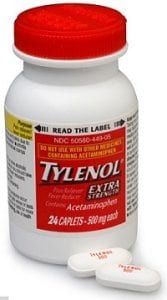 A lawsuit that claims Tylenol killed an Alabama woman in 2010 is scheduled to start trial Sept. 19, 2016 in a Pennsylvania federal court. The petition claims acetaminophen in extra strength Tylenol caused acute liver failure that killed the woman.
A lawsuit that claims Tylenol killed an Alabama woman in 2010 is scheduled to start trial Sept. 19, 2016 in a Pennsylvania federal court. The petition claims acetaminophen in extra strength Tylenol caused acute liver failure that killed the woman.Tylenol Bellweather Trial
A federal judge presiding over the woman’s case has designated the lawsuit as a bellweather or test case. This means it could determine the future direction of a few hundred other lawsuits consolidated in his docket. All make similar claims, that Tylenol is linked with liver failure.
Rana Terry, sister of the deceased Denice Hayes, filed a lawsuit in 2012 against the maker of the over-the-counter drug, McNeil Consumer Healthcare, a division of Johnson & Johnson, which is also named as a defendant. The petition alleges the companies are responsible for the death of Ms. Hayes.
The lawsuit alleges Ms. Hayes, 51, died from acute liver after taking Tylenol and Tylenol Extra Strength. The lawsuit petition says Denice Hayes was treated August 23 at Helen Keller Hospital, where she was diagnosed with catastrophic liver damage. She was then transferred to University Hospital in Birmingham, where she died eight days later.
Pennsylvania Federal Court
The lawsuit was originally filed in the Court of Common Pleas in Philadelphia, then transferred to federal court in Pennsylvania. It is one of several lawsuits claiming liver damage from Tylenol at or just above the recommended dosage. The Tylenol cases are consolidated under U.S. District Court Judge Lawrence F. Stengel in Philadelphia.
Judge Stengel summed up the Terry case in a recent order: “This is the first ‘bellwether’ scheduled for trial. (Bellwether) trials should produce representative verdicts and settlements. The parties can use these verdicts and settlements to gauge the strength of the common MDL (Multi District Litigation) claims to determine if a global resolution of the MDL is possible.”
200 Tylenol Cases in MDL
Some 200 other cases are also included in the MDL, in addition to several similar cases filed in New Jersey state court.
Acetaminophen Leading Cause of Liver Failure
Ms. Terry’s lawsuit claims acetaminophen is the leading cause of acute liver failure in the United States.
Prior to her Aug. 31, 2010 death, Ms. Hayes took doses of Tylenol at appropriate times and in appropriate amounts, says the lawsuit.
The petition states that, “Tylenol (was) defectively designed and placed into the stream of commerce by defendants in a defective and unreasonably dangerous condition.”
Tylenol makers failed to warn, says lawsuit
The lawsuit also claims that McNeil and J&J failed to test and place adequate warnings and instructions on the over-the-counter drug.
The lawsuit also claims that Tylenol’s makers intentionally concealed Tylenol and acetaminophen safety issues in order to dupe doctors into recommending it to patients, including Ms. Hayes.
The lawsuit does not name any specific amount of damages that it seeks.
Though the lawsuit will be tried in Philadelphia, Judge Stengel has ruled that Alabama state law will govern the case.
In November 2015, the judge denied McNeil’s motions for summary judgment on several issues, including a request for dismissal of the punitive damage claims under Alabama’s Wrongful Death Act.
FDA on Acetaminophen
In January 2014, FDA asked health care providers to stop giving patients high doses of acetaminophen over concerns about possible liver damage.
A McNeil spokesperson, Marc Boston, responded by email to AL.com regarding the lawsuit’s claims against the OTC medication:
“We are reviewing the rulings and continue to prepare for trial. TYLENOL® (acetaminophen) has more than 50 years of use and over 150 studies to support its safety and efficacy, and, when used as directed, has one of the most favorable safety profiles among over-the-counter (OTC) pain relievers.
Doctors Acetaminophen Warnings
In recent years, some doctors have warned their patients about the risks of acetaminophen.
Related
- Tylenol Liver Damage Lawsuit
- FDA changes Acetaminophen Recommendations

by Matthews & Associates




